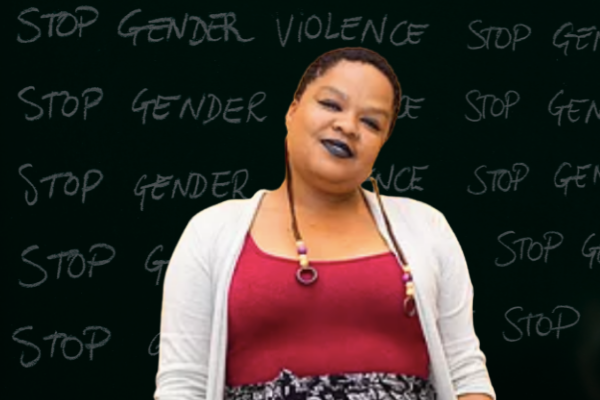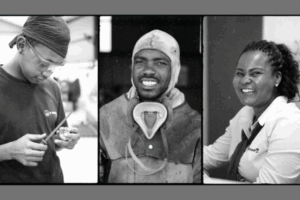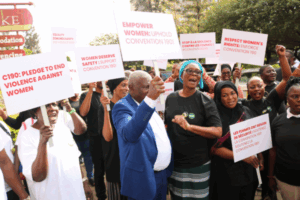In honour of 16 Days of Activism Against Gender-Based Violence, Nontyatyambo Makapela, Programme Officer at Sister Love International South Africa, reflects on how GBV is a barrier to women’s full participation in the economy and the need for building resilient and sustainable support organisations.
Is the response to Gender-Based Violence and Femicide (GBVF) adequate in South Africa?
More is needed to tackle gender-based violence and femicide in the country. Adolescent girls and young women especially require targeted interventions. The latest crime statistics show an increase in rapes, domestic violence and child murders. But we know many GBV cases don’t get reported because the reporting mechanisms remain inaccessible for too many survivors. Worryingly, a lot of people don’t trust our justice system.What are the gaps in GBVF interventions?
There is no meaningful engagement or integration of GBVF efforts within government, civil society and communities. The disconnect leads to GBVF responses that have minimal experiences of women. Women and girls are the most affected, but not everyone has a voice. Currently, we are only reaching a small number of people who are experiencing GBV. Every person should be a stakeholder in the efforts for ending GBV, as opposed to it being an issue for women only. There’s a lack of legal information for GBV survivors. The policies and legal frameworks exist. But the ordinary woman living in rural areas might not know or understand the frameworks. Often the first point of reporting GBV in rural areas is the local institutions such as traditional leaders, churches and families. Yet, we lack a proper working relationship between these institutions and the government. That is a big challenge. Also, perpetrators of GBV need to play a greater role in prevention. It begins with taking responsibility for their acts so that when survivors speak out they don’t fall short.How can we strengthen the national response to GBVF?
Enforce compliance with GBV laws: South Africa has one of the best legislation, policies and strategies for addressing GBV and other human rights violations. The challenge is in implementation. The Gender-based Violence and Femicide National Strategic Plan aims to provide a coordinated national response to the GBVF crisis by the government and South Africa as a whole. However, we have been worried about the government not taking responsibility or committing to a budget for the strategy. Mobilise and allocate resources for GBVF interventions: Effective strategies for responding to GBVF are expensive to implement. For the GBVF Strategic Plan to be successful, we need to return to the drawing board and mobilise the resources for implementation. We need to strengthen collaboration between civil society, communities and government. Political will at the local government level is crucial for the bottom-up approach to addressing the crisis. We the people of South Africa are the ones affected by GBVF and it’s our responsibility to find the remedies. Only then can we have sustainable change. More support for traditional leadership structures: Traditional courts are recognised in South Africa’s legal system and are often responsible for mediating GBV cases in rural areas. Thus, when we look at GBV related legislation, we should also look at traditional leadership structures and find ways to integrate all the relevant stakeholders. All stakeholders and structures should be engaged and sensitised so that all structures can be in line with the policies and laws for addressing GBVF in the country. Simplify GBV laws and policies: Laws and policies should be simplified and made accessible to everyone who is dealing with GBV. Online communication platforms are good for providing quick access to simplified information. But we must ensure the marginalised people can access information through developing suitable channels. Increase GBV education: We must continue with sensitisation and education. We must demand that the people who are supposed to protect us do so. We must demand the inclusion of perpetrators of GBVF in initiatives and campaigns. Approaches for dealing with GBV by intimate partners: Based on our conversations with survivors of intimate partner violence, not all prefer jail for the perpetrator. We still love them and want them to be punished, but not necessarily through serving time. For this reason, mediators in our communities should be sensitised so that they understand that not all survivors want to press charges on perpetrators. However, there should be safe spaces for them to report.What are some positive outcomes of GBVF interventions?
There’s increased activism, education and support for survivors, including legal advocacy and support. We have seen South Africans standing up, saying enough and demanding strategies such as the GBVF National Strategic Plan. Despite the funding challenges, many GBV initiatives are working, albeit in silos and without recognition. A coordinating structure for women’s rights organisations could assist in highlighting GBV work. Ultimately, more resources are needed to sustain support organisations and reach many more people in need of services. Sister Love International South Africa takes a community-centred approach to provide support on issues affecting vulnerable and marginalised people in society. The key issues include Gender-based violence, women’s reproductive health rights, HIV/AIDS, and stigma and discrimination. ALSO READ:- The Labour Research Service response to GBV in communities:
Working together with communities to end gender-based violence
Addressing gender-based violence in the workplace







